The Unbroken Place with Eddy Paul Thomas
Welcome to The Unbroken Place Podcast, where empathy is the cornerstone of our journey. Here, we dive deep into learning to better navigate difficult conversations, enriching work dynamics, and nurturing personal connections in the complexities of contemporary life. Your host, Eddy Paul Thomas, brings a wealth of experience as an author, speaker, entrepreneur, and, at the heart of it all, a dedicated husband and father. Drawing on over two decades of experience in fostering resilient teams and thriving businesses, Eddy extends his insights on conscious leadership and empathy beyond the boardroom, offering listeners actionable advice on applying these lessons to enhance their interpersonal relationships. Join us as we transform relationships and discover the unbreakable bonds that empathy can forge.
Episodes
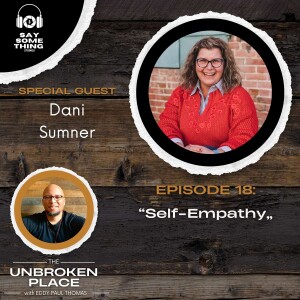
Monday Aug 12, 2024
Monday Aug 12, 2024
Summary
In this conversation, Eddy Paul Thomas and Dani Sumner discuss the importance of empathy for oneself. They explore how empathy allows for a deeper understanding of oneself and others, and how it can lead to more compassionate and meaningful relationships. They also touch on the role of spirituality in maintaining empathy and the importance of being honest and vulnerable in relationships. In this conversation, Dani and Eddy Paul Thomas emphasize the role of vulnerability, accountability, and community in developing empathy. They also explore how empathy can be nurtured in relationships, including marriage and parenting. Dani shares insights from her work as a spiritual director and life transformation coach, highlighting the need to unlearn unhealthy rules and embrace self-compassion. They discuss the challenges of navigating overwhelming emotions and offer advice for cultivating self-empathy. The conversation concludes with a call for employers to embrace empathy in the workplace and for individuals to embark on a journey of self-empathy.
Takeaways
Empathy for oneself is essential in order to have empathy for others.
Understanding and accepting one's own flaws and struggles is a key part of developing self-empathy.
Empathy allows for a deeper understanding of oneself and others, leading to more compassionate and meaningful relationships.
Spirituality can play a role in maintaining empathy and providing a sense of grace and compassion for oneself.
Being honest and vulnerable in relationships allows for open communication and the ability to support and empathize with one another. Empathy is essential for developing deep and meaningful connections with others.
Cultivating self-empathy is a lifelong journey that requires patience and self-reflection.
Chapters
00:00 Introduction and Background02:40 The Power of Empathy08:17 Understanding and Accepting Your Flaws13:46 Empathy as a Path to Deeper Relationships18:17 The Role of Spirituality in Maintaining Empathy21:08 Honesty and Vulnerability in Relationships36:07 The Power of Empathy and Vulnerability39:07 Teaching Empathy to Children46:26 Unlearning Unhealthy Rules and Embracing Self-Compassion53:54 Navigating Overwhelming Emotions with Curiosity and Self-Compassion58:14 Embracing Empathy in the Workplace01:02:11 Embarking on a Journey of Self-Empathy
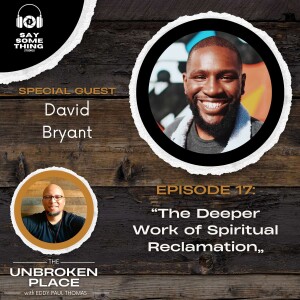
Tuesday Aug 06, 2024
Tuesday Aug 06, 2024
Summary
David Bryant, a missionary, shares his experience as a Black missionary and the challenges he faced in the missions field. He discusses the lack of representation and recognition for Black missionaries and the impact of white supremacy within the mission field and church. He highlights the importance of including all cultures and ethnicities in missions history and training to prevent self-hatred and enable support for minority missionaries. He also emphasizes the need for open and honest conversations about racism and white supremacy to bring healing and change. The conversation explores the challenges and experiences of racial justice and equality within the church, particularly in the context of missions work. It highlights the importance of understanding and addressing racial adversity and the need for healing and biblical perspectives in missions. The discussion also touches on the harmful effects of a consumer mindset in missions and the pressure to show tangible results. The speakers emphasize the significance of doing missions in a way that aligns with biblical principles and the leading of the Holy Spirit. The purpose of this podcast is empathy, and the conversation emphasizes the importance of empathy and understanding in addressing issues. It is not about criticism or comparison, but about caring for and respecting each other. The conversation highlights the need to master empathy before jumping into compassion, as empathy helps us truly understand the problem at hand. Mentorship plays a crucial role in the journey of both mentors and mentees, and it is important to be authentic disciples ourselves before leading others. The church can better support minority missionaries by changing structures, embracing relationships, and redefining missions as a calling rather than a box to check. Missions work is not limited to overseas, but can be done in our own communities. It is about serving the unserved and healing those who have been broken by the church. Missionaries can start by praying faithfully and responding in obedience to God's call.
Takeaways
Black missionaries often face unique challenges and lack representation in the missions field.
White supremacy and racism exist within the missions field and church, leading to self-hatred and discomfort for minority missionaries.
Including all cultures and ethnicities in missions history and training is crucial to prevent exclusion and promote support for minority missionaries.
Open and honest conversations about racism and white supremacy are necessary for healing and bringing about change in the missions field and church. Understanding and addressing racial adversity is crucial for achieving racial justice and equality within the church.
Healing and biblical perspectives are necessary for effective missions work and maintaining spiritual health in the face of racial challenges.
A consumer mindset in missions can be harmful and hinder the true purpose of missions.
The focus should be on doing missions in a way that aligns with biblical principles and the leading of the Holy Spirit, rather than seeking tangible results.
The pressure to show results and the reliance on financial support can distort the true purpose and impact of missions. The purpose of this podcast is empathy, and empathy is crucial in addressing issues and understanding each other.
Mastering empathy before jumping into compassion helps us truly understand the problem at hand.
Mentorship is important for both mentors and mentees, and being authentic disciples ourselves is essential before leading others.
The church can better support minority missionaries by changing structures, embracing relationships, and redefining missions as a calling.
Missions work is not limited to overseas but can be done in our own communities, serving the unserved and healing those who have been broken by the church.
Chapters
00:00 Introduction and Background
03:41 Encountering God's Love and Calling to Missionary Work
04:26 The Challenges Faced by Black Missionaries
07:36 Representation and Diversity in Missions
12:07 Ministering to Marginalized Communities
14:47 Challenges Faced by Black Missionaries in the Field
15:55 The Importance of Diversity and Equity in Missions
21:19 Addressing Racism and White Supremacy in the Church
35:43 The Problematic Financial Aspects of Missions
39:30 Maintaining Spiritual Health in the Face of Racial Adversity
41:05 Healing and Deepening: The Foundation for Effective Missions
47:35 Addressing Historical and Cultural Dynamics in Missions
52:27 Authenticity and Genuine Discipleship in the Missionary Field
57:41 Empathy and Compassion: The Key to Effective Missions
01:01:10 The Destructive Impact of Traditional Missions
01:01:11 The Need for Relational Discipleship
01:04:17 Supporting Minority Missionaries
01:09:58 Missions Work: Not Limited to Overseas
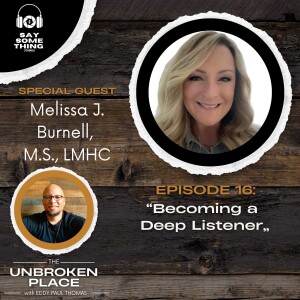
Monday Jul 29, 2024
Monday Jul 29, 2024
Summary
In this conversation, Eddy Paul Thomas interviews Melissa Burnell, a therapist, about the importance of deep listening. Melissa shares her background in psychology and how she transitioned into mental health counseling. They discuss the challenges of deep listening, including distractions and the tendency to listen with preconceived assumptions. They also explore the impact of deep listening on relationships and resolving complex issues. Melissa explains how trauma can affect an individual's ability to listen deeply and offers strategies for supporting trauma survivors. They touch on the role of deep listening in addiction counseling and working with diverse communities, emphasizing the importance of curiosity and checking biases. Deep listening is measured by the presence of compassion and empathy in communication. It is a feeling that someone truly understands and reflects back what is being said. Deep listening can be practiced in various contexts, such as sales and leadership, by understanding and valuing what motivates others. It is important to eliminate distractions and be fully present in conversations. Cultural competency plays a role in deep listening, as different cultures have different communication styles. Mindfulness and emotional intelligence are key resources for developing deep listening skills.
Takeaways
Deep listening involves setting aside preconceived assumptions and truly hearing the perspective of the other person.
Distractions, such as technology and constant busyness, can hinder deep listening.
Trauma can make deep listening challenging, but it is important to create a safe space for individuals to be heard.
Deep listening plays a crucial role in addiction counseling and supporting families affected by addiction.
Cultural sensitivity and curiosity are essential for effective deep listening in diverse communities. Deep listening is measured by the presence of compassion and empathy in communication.
Understanding and valuing what motivates others is crucial in practicing deep listening.
Eliminating distractions and being fully present in conversations is essential for deep listening.
Cultural competency is important in deep listening, as different cultures have different communication styles.
Mindfulness and emotional intelligence are key resources for developing deep listening skills.
Chapters
03:15 The Intersection of Communication and Mental Health06:04 Improving Relationships and Resolving Complex Issues08:07 Challenges and Strategies for Deep Listening15:27 Deep Listening and Trauma18:46 Deep Listening in Addiction Counseling22:21 Cultural Sensitivity and Deep Listening24:13 Curiosity and Checking Biases28:29 Measuring Progress in Deep Listening30:20 Motivation and Deep Listening in Sales and Leadership32:20 Being Fully Present in Conversations35:13 Cultural Competency in Deep Listening39:07 Developing Deep Listening Skills with Mindfulness and Emotional Intelligence
Get in Touch with Melissa:
Email: meburnell@gmail.com
Resources
How to Listen with Intention: The Foundation of True Connection, Communication, and Relationships (How to be More Likable and Charismatic)
Emotional Intelligence 2.0
You're Not Listening
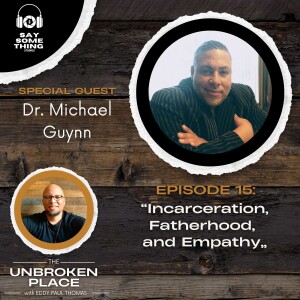
Monday Jul 22, 2024
Monday Jul 22, 2024
Summary
In this conversation, Dr. Michael Guynn discusses his personal journey into fatherhood and how it has shaped him as a person. He emphasizes the importance of responsibility, provision, protection, and support in fatherhood. Dr. Guynn also highlights the significance of empathy in the role of a father, both in personal relationships and in his work as a social worker. He shares insights on the challenges and rewards of being a father and offers advice to other fathers. The conversation explores the importance of empathy in fatherhood and the challenges faced by fathers in maintaining relationships with their children. The speaker emphasizes the need for active listening, consistency, and following through on commitments. He also discusses the emotional journey of fatherhood and the importance of addressing the emotional needs of fathers. The speaker shares strategies for cultivating empathy within families, including being transparent, acknowledging mistakes, and building trust. He also highlights the role of support groups in helping fathers navigate their challenges and reconnect with their families. In this part of the conversation, the focus is on the challenges of reentry for incarcerated fathers and the barriers to empathetic fatherhood in society. The guest, Michael Guynn, shares his insights and experiences in supporting fathers in their reentry journey. He emphasizes the importance of rebuilding trust, gaining stability, and finding one's place in the world after incarceration. The barriers to empathetic fatherhood discussed include pride, boundaries with the mother, and being prepared for difficult questions from the children. Michael also shares a story of how empathy helped resolve a challenging situation for a father he was supporting.
Takeaways
Fatherhood is transformative and requires a higher level of responsibility and care for another life.
Empathy is crucial in the role of a father, both in personal relationships and in working with others.
Being a father involves providing, protecting, and supporting the child and their mother.
Fatherhood requires constant learning, growth, and adaptation.
Effective communication and teamwork with the child's mother are essential in parenting.
Fatherhood is a continuous journey of self-reflection, improvement, and making a positive impact on the child's life.
Empathy helps fathers understand and meet the needs of their children and create a nurturing environment.Fatherhood requires balancing personal and professional responsibilities and making sacrifices for the well-being of the family.
Reconnecting with family requires humility, forgiveness, and taking corrective action.
The journey of fatherhood involves both good times and challenges, and fathers need to be present and engaged in their children's lives. Reentry for incarcerated fathers involves rebuilding trust, gaining stability, and finding their place in the world after incarceration.
Chapters
00:00 Introduction and Family Background03:27 Personal Journey into Fatherhood11:44 Understanding True Manhood and Responsibility17:16 The Protective Nature of Fatherhood26:24 The Role of Empathy in Fatherhood29:20 Balancing Personal and Professional Responsibilities33:29 Creating a Nurturing Environment through Empathy36:26 Continuous Learning and Growth in Fatherhood41:36 The Importance of Empathy in Fatherhood45:24 The Emotional Journey of Fatherhood57:22 Strategies for Cultivating Empathy within Families01:05:48 Addressing the Emotional Needs of Fathers01:14:25 Supporting Fathers: The Role of Support Groups01:21:30 Reconnecting with Family: Challenges and Strategies01:23:57 Introduction to Reentry Challenges01:25:09 Barriers to Empathetic Fatherhood01:32:25 The Power of Empathy in Resolving Challenges01:38:08 Supporting Fathers in Their Reentry Journey01:40:27 The Importance of Empathy in Fatherhood
Book Resources Recommended by Dr. Michael Guynn:
The Invisible Ache: Black Men Identifying Their Pain and Reclaiming Their Power by Courtney B. Vance
New Visions for Black Men by PhD. Na'im Akbar
Self-Care for Black Men: 100 Ways to Heal and Liberate by Jor-El Caraballo
How God Makes Men: Ten Epic Stories. Ten Proven Principles. One Huge Promise for Your Life by Patrick Morley
Learn more about the Unbroken Place Podcast at: www.eddypaulthomas.com/unbrokenplace
Discover the transformative power of empathy in both our personal lives and the workplace with the following resources:
Ok...On Second Thought newsletter on Linkedin.
Ok...On Second Thought articles.
Ok...On Second Thought Resources for the Workplace.
Brought to you by Elevate 1 Consulting.
Produced by Say Some Thing Studios.
Music: "Open Door" & "I Dare You" by Little Glass Men from the free music archive. This work is openly licensed via CC BY 4.0.
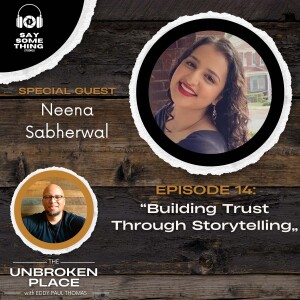
Monday Jul 08, 2024
Monday Jul 08, 2024
Summary
Neena Sebherwal discusses her journey into mental health and how she discovered her passion for storytelling. She emphasizes the importance of vulnerability and authenticity in storytelling and how it can build trust and empathy. She shares a personal story about connecting with an Uber driver over their experiences in therapy, highlighting the power of shared humanity. Neena also addresses the challenges of storytelling on social media, including the prevalence of controversy and the overwhelming number of brands competing for attention. Neena Sabherwal shares her experience of building trust through storytelling. She emphasizes the importance of authenticity and connecting with people through storytelling. Neena believes that storytelling can inspire hope and uplift others. She also discusses the challenges of balancing storytelling and marketing best practices. Neena highlights the limitations of AI in storytelling and the importance of human touch in creating emotional connections. She advises individuals to listen to others, stay present, and explore their own stories to become better storytellers. Neena recommends following Jonathan Carrington and Awaken Pittsburgh for inspiring and impactful storytelling.
Takeaways
Vulnerability and authenticity are key in storytelling, especially in the context of mental health.
Storytelling can build trust and empathy by connecting people through shared experiences.
Social media can be a powerful tool for storytelling, but it also presents challenges such as controversy and competition from numerous brands.
Listening with an open mind and seeking to understand others' perspectives is essential for empathy and compassion.
Sharing personal stories can have a significant impact on individuals and create a sense of connection and support.
Authenticity and connecting with people through storytelling can build trust.
Storytelling can inspire hope and uplift others.
Balancing storytelling and marketing best practices can be challenging.
AI has limitations in storytelling and human touch is important for emotional connections.
Listening, staying present, and exploring personal stories can improve storytelling skills.
Follow Jonathan Carrington and Awaken Pittsburgh for inspiring and impactful storytelling.
Chapters
00:00 Neena's Journey into Mental Health and Content Creation15:29 Defining Storytelling in the Context of Mental Health and Well-being28:05 The Impact of a Meaningful Story on the Audience35:22 Balancing Engagement and Authenticity in the Marketing World35:51 Balancing Authenticity and Marketing47:39 Common Mistakes in Storytelling51:49 Becoming a Better Storyteller54:47 Inspiring LinkedIn Profile: Jonathan Carrington
Learn more about the Unbroken Place Podcast at: www.eddypaulthomas.com/unbrokenplace
Discover the transformative power of empathy in both our personal lives and the workplace with the following resources:
Ok...On Second Thought newsletter on Linkedin.
Ok...On Second Thought articles.
Ok...On Second Thought Resources for the Workplace.
Brought to you by Elevate 1 Consulting.
Produced by Say Some Thing Studios.
Music: "Open Door" & "I Dare You" by Little Glass Men from the free music archive. This work is openly licensed via CC BY 4.0.
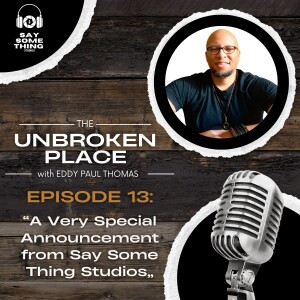
Tuesday Jul 02, 2024
Tuesday Jul 02, 2024
Summary
Say Something Studios is launching two new podcasts: 'E1 at Work' and 'The Doctorate Life.' 'E1 at Work' will focus on conscious leadership and building business growth, while 'The Doctorate Life' will bridge the gap between academia and business. Both shows will feature conversations with industry leaders and experts, as well as resources to help listeners advance their careers or businesses. The hosts of 'The Doctorate Life' have a Doctorate of Business Administration and aim to create a community of practice for doctors across industries. They will discuss the challenges and celebrations of post-grad life and provide support and encouragement to listeners.
Takeaways
Say Something Studios is launching two new podcasts: 'E1 at Work' and 'The Doctorate Life'.
'E1 at Work' will focus on conscious leadership and building business growth.
'The Doctorate Life' will bridge the gap between academia and business.
Both shows will feature conversations with industry leaders and experts.
Listeners will have access to resources to help advance their careers or businesses.
'The Doctorate Life' aims to create a community of practice for doctors across industries.
The hosts will discuss the challenges and celebrations of post-grad life.
Listeners will receive support and encouragement from the hosts.
Learn more about the Unbroken Place Podcast at: www.eddypaulthomas.com/unbrokenplace
Discover the transformative power of empathy in both our personal lives and the workplace with the following resources:
Ok...On Second Thought newsletter on Linkedin.
Ok...On Second Thought articles.
Ok...On Second Thought Resources for the Workplace.
Brought to you by Elevate 1 Consulting.
Produced by Say Some Thing Studios.
Music: "Open Door" & "I Dare You" by Little Glass Men from the free music archive. This work is openly licensed via CC BY 4.0.
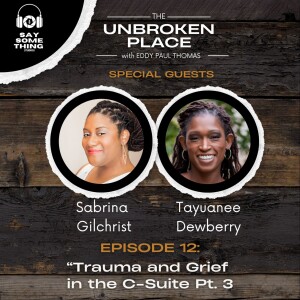
Monday Jun 24, 2024
Monday Jun 24, 2024
Summary
The conversation explores the importance of peer support and creating a culture of empathy in the C-suite. It emphasizes the need for leaders to prioritize their mental health and well-being. The stigma around mental health in the C-suite is discussed, and proactive steps for leaders to take care of themselves are highlighted. The importance of finding a support system, having authentic conversations, and changing the narrative around mental health are emphasized. The conversation concludes with information on how to follow the speakers' work.
Takeaways
Leaders in the C-suite should prioritize their mental health and well-being.Creating a culture of empathy and support is crucial in the workplace.There is a stigma around mental health in the C-suite that needs to be addressed.Leaders should find a support system and have authentic conversations about their mental health.Proactive steps for leaders include taking care of their physical health, finding a work-life balance, and seeking therapy if needed.Changing the narrative around mental health and creating a culture of self-care is essential.
Chapters
00:00 Peer Support and Vulnerability in the C-Suite02:55 Creating a Healthy Work Culture40:05 2024 Episode Cover The Unbroken Place Outro Cover for Youtube with Music Final.mp440:41 Elevate 1 Audio Commercial Spring 2024 Final Video.mp442:20 Say Some Thing Studios Closing.mp442:28 twitchy_logo_170059_original.mp442:34 2024 Eddy Paul Thomas Logo Outro.mp4
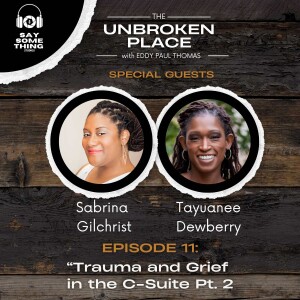
Monday Jun 17, 2024
Monday Jun 17, 2024
Summary
In this conversation, Sabrina Gilchrist and Tayuanee Dewberry discuss the topic of trauma and grief in the C-suite. They explore the challenges faced by leaders in maintaining a facade of strength, the importance of peer support, and the warning signs of burnout. They also delve into the unique stressors and mental health challenges that high-level leaders face in the nonprofit sector. The conversation highlights the need for systemic change and advocacy to support leaders in the C-suite and emphasizes the importance of collaboration and community in overcoming isolation and promoting mental well-being.
Takeaways
Maintaining a facade of strength can be challenging for leaders in the C-suite, and it is important for them to find peer support and create safe spaces for vulnerability.
Warning signs of burnout in leaders include disengagement, chronic feelings of disengagement, and breaks in relationships with staff.
High-level leaders in the nonprofit sector face unique stressors, such as doing more with less, fundraising challenges, and the perception of their occupation as lesser.
Isolation and feelings of silence are common among leaders in the C-suite, and it is crucial to promote collaboration and community to overcome these challenges.
Systemic change and advocacy are needed to support leaders in the C-suite and address the mental health challenges they face.
Mindfulness, deep breathing exercises, and finding healthy outlets for stress can help leaders manage their mental well-being in the C-suite.
Chapters
00:00 Peer Support and Vulnerability in the C-Suite
05:02 Warning Signs of Burnout and Mental Health Challenges08:19 Unique Stressors in the Nonprofit Sector15:00 Creating a Healthy Work Culture26:55 Introduction26:58 The Impact of Trauma on Leadership
Resources
Register for the Trauma in the C-Suite Virtual Series: https://www.eventbrite.com/e/trauma-in-the-c-suite-the-virtual-series-tickets-926547858587?aff=oddtdtcreator
Uncharitable Movie: https://uncharitablemovie.com/
Uncharitable Book: https://a.co/d/i7j2dqN
Learn more about the Unbroken Place Podcast at: www.eddypaulthomas.com/unbrokenplace
Discover the transformative power of empathy in both our personal lives and the workplace with the following resources:
Ok...On Second Thought newsletter on Linkedin.
Ok...On Second Thought articles.
Ok...On Second Thought Resources for the Workplace.
Brought to you by Elevate 1 Consulting.
Produced by Say Some Thing Studios.
Music: "Open Door" & "I Dare You" by Little Glass Men from the free music archive. This work is openly licensed via CC BY 4.0.

Monday Jun 10, 2024
Monday Jun 10, 2024
Summary
The conversation explores the topic of trauma and grief in the C-suite, highlighting the expectations and factors that prevent executives from displaying vulnerability. The guests discuss the societal pressure to be invincible and the fear of being seen as weak or incompetent. They also touch on the role of company culture in contributing to C-suite burnout and trauma. The importance of executive coaching is emphasized, as it provides a neutral and objective perspective to help leaders navigate the complexities of their roles and address internal struggles.
Takeaways
Executives in the C-suite often face pressure to be invincible and are discouraged from displaying vulnerability.
Company culture plays a significant role in contributing to C-suite burnout and trauma.Executive coaching is crucial in supporting leaders at the top, providing an objective perspective and helping them navigate the complexities of their roles.
Cultural competency and awareness are essential when seeking an executive coach or therapist to ensure they can provide the necessary support.
The intersectionality of race, gender, and other identities adds additional layers of complexity to the experiences of C-suite leaders.
Learn more about the Unbroken Place Podcast at: www.eddypaulthomas.com/unbrokenplace
Discover the transformative power of empathy in both our personal lives and the workplace with the following resources:
Ok...On Second Thought newsletter on Linkedin.
Ok...On Second Thought articles.
Ok...On Second Thought Resources for the Workplace.
Brought to you by Elevate 1 Consulting.
Produced by Say Some Thing Studios.
Music: "Open Door" & "I Dare You" by Little Glass Men from the free music archive. This work is openly licensed via CC BY 4.0.
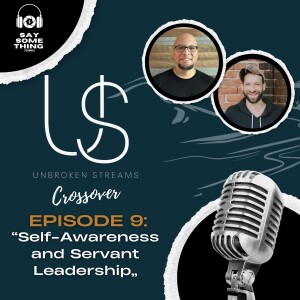
Tuesday May 28, 2024
Tuesday May 28, 2024
Summary
The conversation explores the concepts of self-awareness and servant leadership, drawing from personal experiences and observations. It delves into the intersection of individualism, humility, and the impact of leadership on organizational culture. The discussion highlights the importance of self-awareness, community, and the balance between individual success and collective well-being. The conversation delves into the themes of self-awareness, servant leadership, and conscious leadership, emphasizing the importance of trust, empowerment, and community in the workplace. It also explores the impact of self-awareness on personal and professional relationships, as well as the role of therapy and mental health in achieving conscious leadership.
Takeaways
Self-awareness and servant leadership are rooted in the understanding of one's own values, motivations, and impact on others.
The balance between individual success and collective well-being is crucial for effective leadership and organizational culture.
The intersection of individualism, humility, and servant leadership reveals the complexities of leadership in different cultural contexts.
Transparency, honesty, and empowerment are key elements in fostering a culture of servant leadership and conscious leadership.
The impact of leadership on mental health, employee satisfaction, and organizational growth underscores the significance of servant leadership in modern work environments. Self-awareness is essential for conscious leadership and servant leadership in the workplace.
Trust and empowerment are key components of successful organizations, leading to lower turnover rates and higher employee satisfaction.
The impact of self-awareness extends beyond the workplace, influencing personal relationships and community dynamics.
Therapy and mental health play a crucial role in achieving self-awareness and conscious leadership, contributing to personal growth and professional success.
Chapters
00:00 Exploring Self-Awareness and Servant Leadership
11:38 The Intersection of Individualism and Humility in Leadership
28:50 The Power of Self-Awareness and Servant Leadership
36:35 Building Trust and Empowerment in the Workplace
42:34 The Impact of Self-Awareness on Personal and Professional Relationships
51:42 The Role of Therapy and Mental Health in Conscious Leadership

The Unbroken Place Podcast
Welcome to The Unbroken Place Podcast, where empathy is the cornerstone of our journey. Here, we dive deep into learning to better navigate difficult conversations, enriching work dynamics, and nurturing personal connections in the complexities of contemporary life. Your host, Eddy Paul Thomas, brings a wealth of experience as an author, speaker, entrepreneur, and, at the heart of it all, a dedicated husband and father. Drawing on over two decades of experience in fostering resilient teams and thriving businesses, Eddy extends his insights on empathy beyond the boardroom, offering listeners actionable advice on applying these lessons to enhance their interpersonal relationships. Join us as we transform relationships and discover the unbreakable bonds that empathy can forge.






